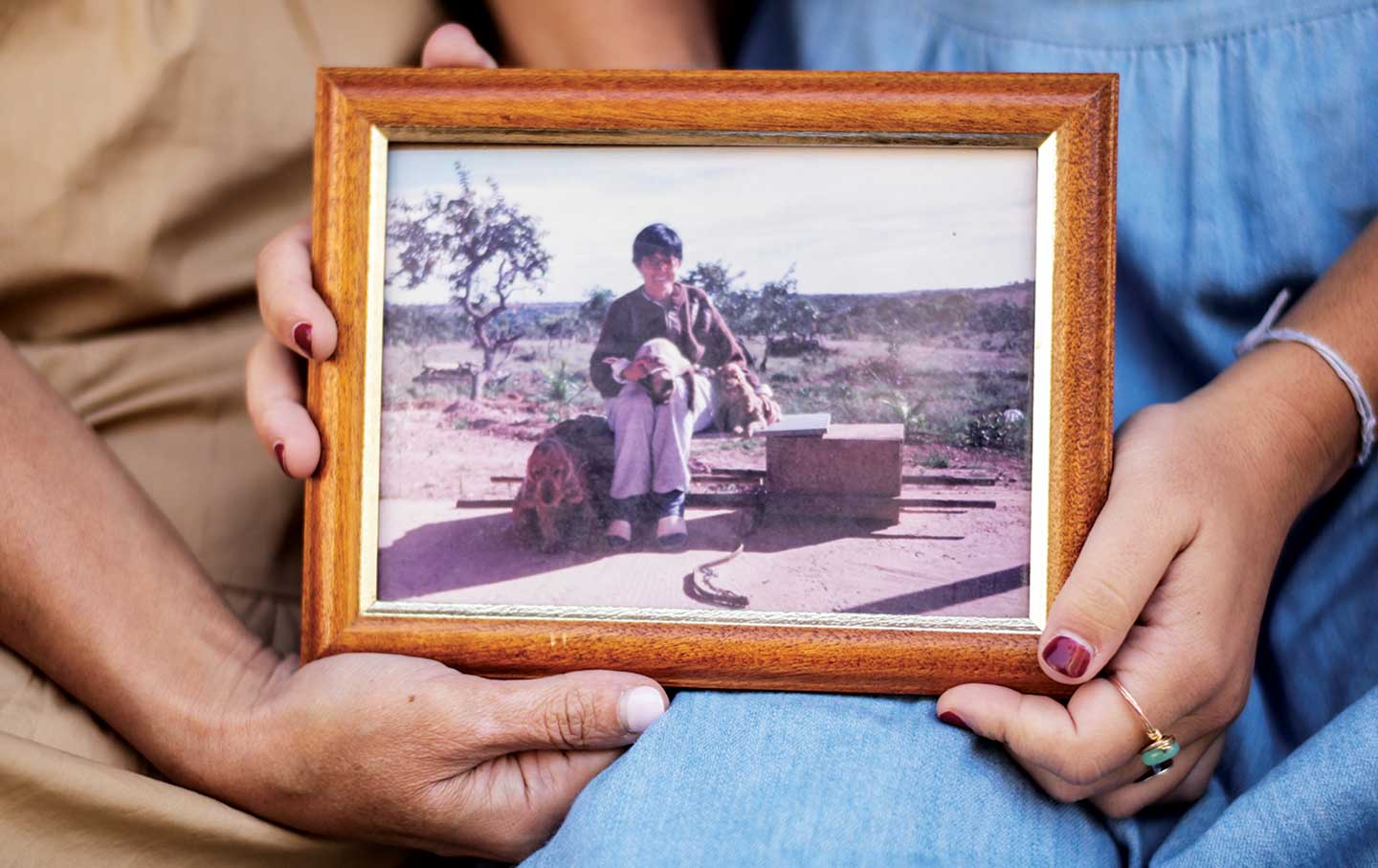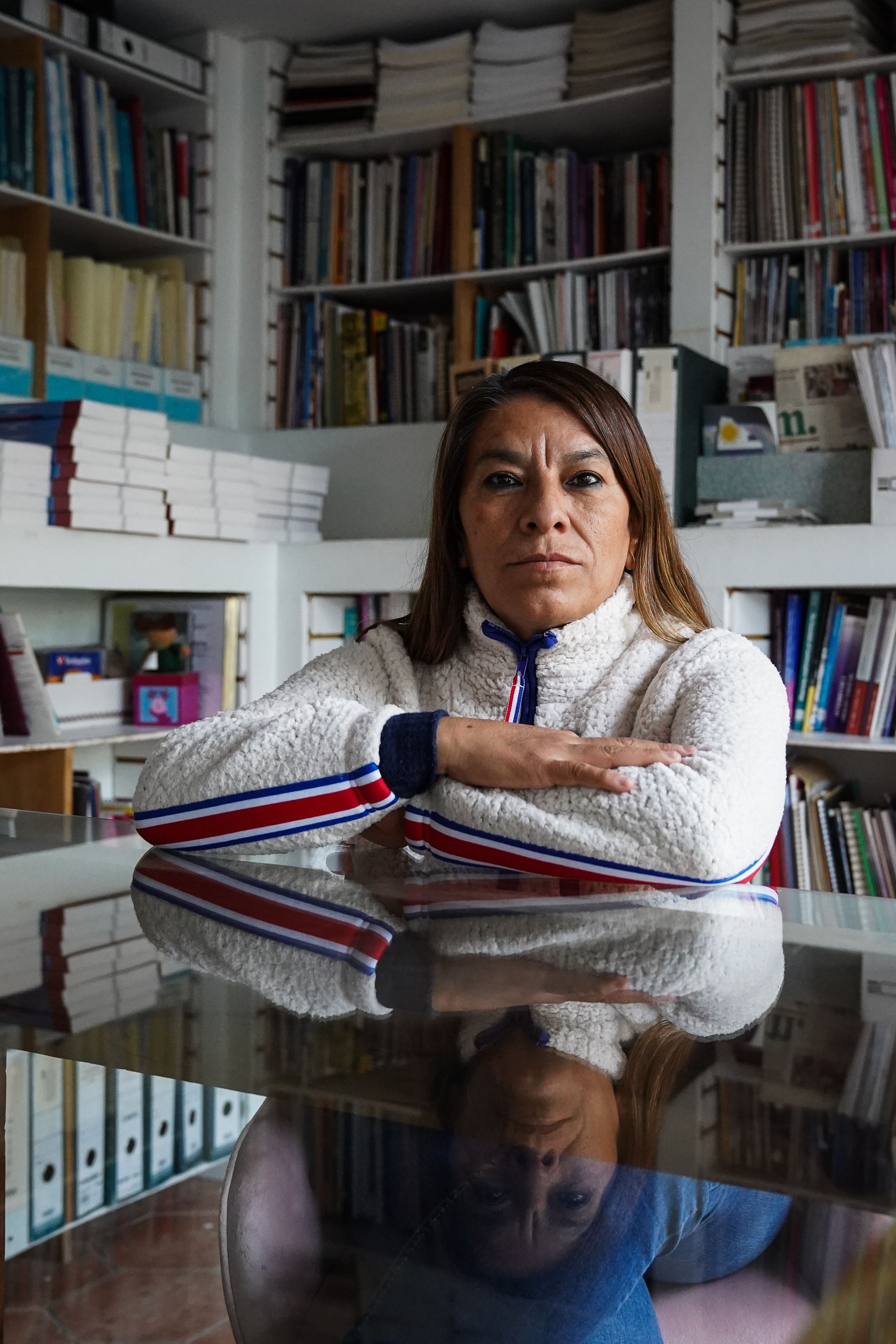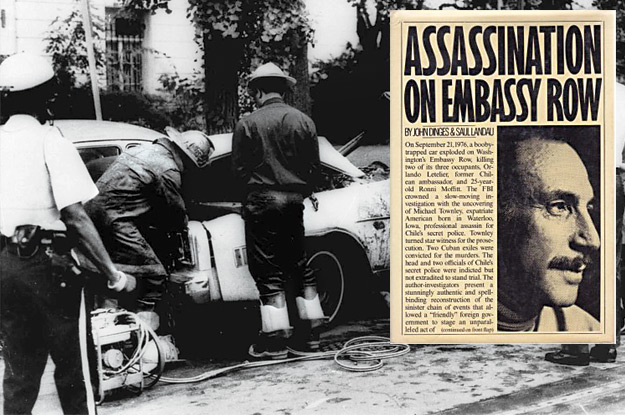Judi Lynn
Judi Lynn's Journal50 Years Ago, My Family Fled Chile. This Year, I Returned.
SEPTEMBER 29, 2023
I went to Chile for the anniversary of the 1973 coup to trace the country’s painful history—and my own.
MARA MARQUES CAVALLARO

Presente!: Marques Cavallaro holding a photo of her grandmother.
(Pablo Unzueta)
This article appears in the October 16/23, 2023 issue, with the headline “Fifty Years Later.”
SANTIAGO—The day before the 50th anniversary of the coup that ousted Salvador Allende, I watched a father and his young daughter sitting quietly at the Museum of Memory and Human Rights. They looked solemnl
. . .
I spent the 50th anniversary of the coup crisscrossing Santiago, in protest and in vigil, with my mom and a caravan of other Brazilian former exiles. Like the children, we were here to witness a profound moment in history, but also to trace the lines of our own. I carried a framed photo of my grandmother, Tércia Maria Rodrigues Mendes, in my backpack. It was here, 50 years ago, that she lost her country for the second time.
She was 22 on the day of the coup, September 11, 1973—already a mother, a widow, and a refugee. Earlier that year, after the Brazilian military had tortured and killed her husband—my grandfather, Jarbas Pereira Marques—she fled Brazil’s dictatorship, traveling by bus to Allende’s Chile, the capital of a new political imagination. At the time, an estimated 12,200 refugees from Brazil, Bolivia, Uruguay, and Argentina were living in Chile—many of them, like my grandma, leftists escaping repression. It was here that she moved into a wooden home insulated with newspapers; here that she was reunited with my mom, then only 16 months old and from whom she had been separated; here that she joined a new resistance.
By late June, after the Tanquetazo (tank putsch), a failed coup attempt, she was marching with workers demanding that the government provide weapons should the military attack again—a request Allende denied. When the next attempt came, in September, she was living in a población in Peñalolén called Lo Hermida, a settlement then associated with the Revolutionary Left Movement (MIR), its politics worn proudly in sector names like “Heroic Vietnam.” This time, behind Pinochet, the military succeeded. Armed forces raided Lo Hermida, destroying my grandmother’s house, and she became the survivor of a second coup—her life now at risk for being a foreigner, for being poor, for being an Allendista, and for not having a home to return to at curfew.
. . .
Indeed, between 1930 and the 1990s, many Latin American countries (including Argentina, Bolivia, Brazil, Chile, the Dominican Republic, El Salvador, Guatemala, Honduras, Paraguay, and Uruguay) suffered brutal dictatorships fueled either directly or indirectly by US interventions. Beginning in the 1960s, security forces from across the region formed their own sinister web of repression, later formalized as Operation Condor—a coordinated, transnational attack on civilian and militant opposition to dictatorships. As a child, I traced one scar of this violence: the marks of a wound on my stepgrandpa’s abdomen, from the Uruguayan authorities who had stabbed and imprisoned him when he escaped Brazil.
. . .
In Latin America, we have a tradition of declaring that those who suffered political violence, whom we have lost, are still with us; that we carry their legacies and continue their fight. We say their names, and then the word presente—present.
More:
https://www.thenation.com/article/world/chile-coup-anniversary-grandmother/
A new border crossing: Americans turn to Mexico for abortions
Sep. 25, 2023 at 3:43 pm

| Verónica Cruz Sánchez, the founder and leader of Las Libres, in the library at Las Libres house in Guanajuato, Mexico on Dec. 10, 2021. Cruz, who helped found a reproductive rights organization in Mexico, said she has helped roughly 20,000 American women in 23 different states to secure abortion pills. (Marian Carrasquero / The New York Times)
By Zolan Kanno-Youngs and Edyra Espriella
The New York Times
MEXICO CITY — The text message Cynthia Menchaca received this summer was one she was seeing more and more: A woman living in Texas said she had left a violent relationship only to discover she was pregnant, and she desperately wanted an abortion. The woman had learned that Menchaca could send her abortion pills from Mexico, where the procedure has been decriminalized in several states.
But the growing U.S. demand for abortion care is not limited to deliveries of medication, according to advocates such as Menchaca, who lives in Coahuila state in northeastern Mexico.
Clinics in Tijuana and Mexico City, as well as activists in the northwestern city of Hermosillo, say they have seen women crossing the border from Texas, Louisiana and Arizona seeking access to abortion.
“Before, the women from Sonora would go to the United States to access abortions in clinics,” said Andrea Sanchez, an abortion-rights activist, referring to the Mexican state that borders Arizona. “And now the women from the United States come to Mexico.”
More:
https://www.seattletimes.com/nation-world/a-new-border-crossing-americans-turn-to-mexico-for-abortions/
The Chilean president's D.C. visit took me back to Pinochet's rule
Gabriel Boric attended ceremonies for Salvador Allende, killed in the 1973 CIA-backed coup, and an exiled diplomat killed in Washington three years later
By Pamela Constable
September 25, 2023 at 3:21 p.m. EDT

Chilean President Gabriel Boric after laying a flower Saturday at the memorial to Orlando Letelier, an exiled former Chilean diplomat, and his American assistant, Ronni Moffitt, who were killed in a 1976 car bombing at Sheridan Circle in D.C. (Pamela Constable/The Washington Post)
At the edge of Sheridan Circle in Northwest Washington sits a tree stump crowned with an engraved stone disk. Barely noticeable to the drivers who whiz by on Massachusetts Avenue, the spot has poignant meaning for the crowd that gathers here every September to mourn twin tragedies in the modern history of Chile.
Fifty years ago this month, on Sept. 11, 1973, Chile’s armed forces, backed by the CIA, staged a brutal coup that overthrew the democratically elected socialist government in Santiago. President Salvador Allende was killed, and power was seized by the right-wing dictator Augusto Pinochet, who led 17 years of military rule — a period when thousands of Chileans were tortured, killed or disappeared.
Three years after the coup, on Sept. 21, 1976, a car bombing at Sheridan Circle killed an exiled former Chilean diplomat, Orlando Letelier, and his American assistant, Ronni Moffitt. The crime was ultimately traced to agents of Pinochet’s secret police.
I know about the annual ritual at the circle because I worked and lived in Chile as a journalist for long stints during the Pinochet era, during which I had some of the most horrifying and moving experiences of my career. Later, back in Washington, I attended the ceremony once or twice, briefly reliving the intensity of those times, but the news increasingly took me to other distant conflicts — especially after 2001, when the date Sept. 11 acquired a new notoriety, in the United States and around the world.
More:
https://www.washingtonpost.com/world/2023/09/25/chile-pinochet-coup-boric-letelier/
Or, without subscription:
https://web.archive.org/web/20230925205438/https://www.washingtonpost.com/world/2023/09/25/chile-pinochet-coup-boric-letelier/









(As the video mentions, Ronnie Moffit's husband, Michael Moffit, was also in the car, was injured, but survived it.)
The OAS and a Veiled Coup Attempt in Guatemala
Rubén M. Perina | September 21, 2023
Following the first-round of presidential elections on June 25, 2023, the losing candidates, representing the ruling party and the Guatemalan political establishment, initiated a series of controversial judicial actions that essentially attempted a veiled coup d’état. Through the Public Ministry of the Attorney General’s Office, such candidates questioned the results and tried to prevent the certification of the second-place candidate, Bernardo Arévalo (Movimiento Semilla Party). Failing that, they sought to ban him from the second-round on August 20, 2023. The coup attempt continued after Arévalo won the runoff with approximately 60 percent of the votes.
The Guatemalan government and the political establishment fear Arévalo’s intention to eradicate corruption and impunity. Some even suspect that he wants to reinstate the International Commission Against Impunity (CICIG). (In May 2023, the U.S. government designated Guatemala’s current Attorney General, María Consuelo Porras, for her involvement in corruption). His anti-corruption stance was his main campaign motto and appeal to marginalized groups and young voters.
The new attempt at a veiled coup seeks to further harm Arévalo. A minimum of popular support (0.30 percent of registered voters) is mandated to participate in elections. Even though he obtained significantly more support than required in both ballots , a prosecutor from the Attorney General’s Office ordered the Voters’ Registry Office to suspend his party, also alleging irregularities in the registration of its members. The prosecutor had previously ordered the Registry to seize the party’s records and issued an arrest warrant for its director and two of its officials. Paradoxically, the day before the suspension, the Electoral Tribunal (TSE) validated the results of the ballotage and proclaimed Arévalo President-elect.
After the suspension, the Guatemalan Congress stopped recognizing the Movimiento Semilla Party as a congressional bloc and declared its members as independent legislators, barring them from participating in committees and essentially curtailing their influence. This was an attempt to force the President-elect to abandon his proposal against corruption.
More:
https://theglobalamericans.org/2023/09/the-oas-and-a-veiled-coup-attempt-in-guatemala/
Boric leads tribute to Letelier, urging US to reevaluate its role in dictatorship
Online News Editor
September 23, 2023
2 minutes read
Washington, Sep 23 (EFE) – Chilean President Gabriel Boric led an emotional tribute to former Chilean Foreign Minister Orlando Letelier in Washington on Saturday, just steps away from where he was assassinated in 1976 with a car bomb for his tireless fight against the dictatorship of Augusto Pinochet (1973-1990).
Boric delivered a speech in which he urged the US to reflect on its role in Pinochet’s dictatorship and in other Latin American countries during what was known as “Plan Condor” at the height of the Cold War.
“We hope the US will reflect more deeply on what they promoted in Chile, not only in Chile but also in other Latin American countries,” said Boric, the most leftist president to come to power since the ousted Salvador Allende (1970-1973).
Boric expressed gratitude to a group of progressive members of the US Congress, including Senator Bernie Sanders and Representative Alexandria Ocasio-Cortez, who introduced a resolution to apologize for Washington’s role in the dictatorship and demanded the declassification of more documents related to these events.
. . .
His speech, delivered under constant rain, took place in Sheridan Circle Plaza, in the heart of Washington, just a few meters from the site where, on September 21, 1976, a car bomb killed Letelier. Letelier had served as foreign minister in the government of Salvador Allende and had been a tireless advocate for the return of democracy in Chile.
Alongside Letelier, American Ronni Moffit, who worked for the Institute for Political Studies (IEP), a think tank that had served as a platform for Letelier to denounce the Chilean dictatorship, lost her life.
More:
https://www.laprensalatina.com/boric-leads-tribute-to-letelier-urging-us-to-reevaluate-its-role-in-dictatorship/
Christian Socialists Are Reclaiming Faith from the Right
For these Christians, religion is no opiate—it’s a profound call to action.
MATT MCMANUS SEPTEMBER 18, 2023
CHICAGO?—?We open with a prayer. Then an eclectic array of academics, pastors, activists, social workers and blue-collar churchgoers exchange season’s greetings, thank God for bringing us together, and ask them to look after a sick family member. Today’s reading is a tough one: Marx’s Ecology: Materialism and Nature by John Bellamy Foster. Soon enough, discussion begins. There are knowing sighs at Marx condemning the conservative Christian idea that the world is a gift from God to interminably exploit. There’s also pushback: Should we readily agree with an avowed atheist who called religion a drug?
Then there’s another prayer, this time for the then-upcoming Chicago mayoral election?—?everyone hopes God is on Brandon Johnson’s side?—?and a statement of hope about the environment. And that wraps this meeting of the ecology reading group of the Institute for Christian Socialism?—?a name the political Right would locate somewhere between oxymoron and heresy.
The Institute for Christian Socialism (ICS), founded in the late 2010s by scholars and activists, is one of a growing number of left Christian organizations to emerge or be revived over the past decade, from radical Black churches to LGBTQ-affirming congregations. Stridently opposed to the right-wing approach to the Gospels, Christian leftists and socialists profess a radical faith centered on our duties to the least among us.
When Jesus declared that it’s easier for a camel to pass through the eye of the needle than for a rich man to enter heaven, or insisted that God stands with the “wretched of the earth,” he laid the groundwork for Christian socialism.
Conventional wisdom suggests all forms of socialism share a bedrock commitment to atheistic materialism, following Marx’s infamous description of religion as the “opiate of the masses.” Less remembered is that, in context, Marx suggests religion is something like medicinal: it’s “the sigh of the oppressed creature, the heart of a heartless world, and the soul of soulless conditions.” Many socialists agree with Marx’s dialectical take here, that one of religion’s major draws is how it makes sense of an unjust world. But to Christian socialists, religion isn’t merely consolation; it’s a profound call to action and good works.
More:
https://inthesetimes.com/article/christian-socialism-mlk
Workers uncover eight mummies and pre-Inca objects while expanding the gas network in Peru
BY FRANKLIN BRICEÑO
Updated 5:55 PM CDT, September 22, 2023
LIMA, Peru (AP) — Some archaeologists describe Peru’s capital as an onion with many layers of history, others consider it a box of surprises. That’s what some gas line workers got when their digging uncovered eight pre-Inca funeral bales.
“We are recovering those leaves of the lost history of Lima that is just hidden under the tracks and streets,” Jesus Bahamonde, an archaeologist at Calidda, the company that distributes natural gas in the city of 10 million people, said Friday.
He said the company’s excavation work to expand its system of gas lines over the last 19 years has produced more than 1,900 archaeological finds of various kinds, including mummies, pottery and textiles. Those have mostly been associated with burial sites on flat ground.
The city also has more than 400 larger archaeological sites that have turned up scattered through the urban landscape. Known as “huacas” in the Indigenous Quechua language, those adobe constructions are on top of hills considered sacred places.
The number of relics isn’t surprising. The area that is now Lima has been occupied for more than 10,000 years by pre-Inca cultures, then the Inca Empire itself and then the colonial culture brought by the Spanish conquerors in 1535.
More:
https://apnews.com/article/peru-preinca-burial-site-9245dd878d8763893e79fddd5c39e47b
The second coming of Luiz Incio Lula da Silva
Brazil’s energetic president is set on galvanising the non-Western BRICS grouping, not least to fight climate change
MICHAEL JACOBS 22 SEPTEMBER 2023
Students of the art of political rowing-back will have recognised a fine example of the genre earlier this week. Brazil’s President Lula declared on Sunday that Vladimir Putin would be welcome at next year’s G20 summit in Rio de Janeiro, and wouldn’t be arrested as a suspected war criminal as Brazil’s membership of the International Criminal Court requires. Indeed, if arresting him was compulsory, Brazil might leave the court. A day later, after a domestic and international outcry, Lula subtly altered his position. Putin would indeed be arrested, he insisted, because Lula took Brazil’s commitment to the ICC very seriously.
The episode rather neatly demonstrated the balancing act Lula is trying to perform on the world stage. He has been assiduously positioning Brazil as an independent global power, seeking to act as a mediator in Ukraine rather than condemning Russia as demanded by the United States and Europe, promoting the non-Western BRICS club of major economies (Brazil, Russia, India, China and South Africa) and flying to Cuba to reiterate Brazil’s role as a leader of the G77 grouping of developing countries.
But he has also just signed a joint declaration with the United States proclaiming the G20 group of large economies the principal forum for multilateral diplomacy and declares himself a global champion of democracy, warning of the perils of authoritarian populism promoting racism and civil violence. (Brazil had its own “invasion of Congress” events in January this year when supporters of former far-right president Jair Bolsonaro stormed parliament and the Supreme Court in an attempt to overthrow Lula’s election victory, a deliberate echo of the events of 6 January 2021 in Washington, DC.)
The jury may be out on whether this balancing act can work, but no one could accuse Lula of passivity in foreign policy. In the past few weeks he has attended the Global Financing Pact summit in Paris, the BRICS summit in Johannesburg, the G20 summit in Delhi, the G77 summit in Havana and the UN General Assembly and Climate Ambition and Sustainable Development summits in New York, and convened his own Amazon summit in Brazil’s northeastern city of Belem. This year Brazil chairs the Latin American trade partnership Mercosur. Next year it will hold the presidency of the G20. In 2025 it will lead the BRICS and will also host the critical UN climate summit COP30.
To appreciate what Lula is seeking to achieve from this feverish activity it helps to understand the man. Now seventy-seven, Luiz Inácio Lula da Silva (“Lula” was an early nickname he later formally incorporated into his official name) has not had the usual politician’s life. Born to poor parents who migrated from Brazil’s northeast to São Paulo in search of work, Lula didn’t learn to read until he was ten. Starting out as a metalworker in the automobile industry, he became a trade unionist, was elected leader of the Metalworkers’ Union at the age of thirty, and then led major strikes and democratic protests against Brazil’s military dictatorship in the 1970s.
More:
https://insidestory.org.au/the-second-coming-of-luiz-inacio-lula-da-silva/
Brief for Murder: Pinochet's Apologists Five Decades On
SEPTEMBER 20, 2023
BY BINOY KAMPMARK

Photograph Source: Ministerio de Relaciones Exteriores de Chile – CC BY 2.0cl
During the Cold War, assassinations most foul were entertained as necessary measures to advance the set cause. In Latin America, military regimes were keenly sponsored as reliably brutal antidotes to the Marxist tic, or at the very least the tic in waiting. Any government deemed by Washington to be remotely progressive would become ripe targets for violent overthrow.
To this day, the murderers of Chile’s socialist president Salvador Allende, (wait, we hear the first apologist mock, he was not murdered but suicided out of choice) along with thousands of innocents continues to receive briefs in their defence.
On September 15, Mary Anastasia O’Grady, a Wall Street Journal scratcher turned police-state boot polisher bombarded her Australian Radio National host, Tom Switzer, with the stock libels about Allende’s legacy and the military coup of September 11, 1973. The interview will go down as one of Switzer’s poorer efforts, despite meek attempts to bring his frothing interviewee back to the bloody account opened by the military regime.
Perhaps we could have expected little else. As Jeffrey Goldberg so fittingly remarked in The Atlantic in September 2010, O’Grady “never met a fascist Central American oligarch she didn’t like”. Her penchant for falsifying history in the name of pathological polemics is the stuff of legend.
More:
https://www.counterpunch.org/2023/09/20/brief-for-murder-pinochets-apologists-five-decades-on/
Greenpeace celebrates correction of Brazil's climate targets
Greenpeace International
20 September 2023 • 2 min read
Brazil no longer violates the Paris Agreement, but concrete measures and clearer goals that go beyond eliminating deforestation are still needed.
New York City – During an address at the UNSG Climate Ambition Summit on Wednesday, 20 September, Brazil’s Ministry of Environment and Climate Change, Marina Silva, officially announced the revision of the country’s Nationally Determined Contribution (NDC). The new target restores the GHG emission reduction target to what was committed in 2015, and increases the reduction targets for 2025, from 37% to 48%, and for 2030, from 50% to 53%. The target had been reduced during the previous administration under President Jair Bolsonaro. Greenpeace views Minister Marina Silva’s announcement as an encouraging step towards rebuilding Brazil’s environmental governance and advancing the climate agenda.
“Brazil has the potential to be the first high-emitting country to be carbon negative by 2045. Currently, the country ranks as the 7th-largest greenhouse gas emitter globally, with most of its emissions originating from deforestation. Today’s announcement regarding the revision of the country’s NDC is a symbolically significant step. But more is needed – like all countries Brazil needs to enhance the ambition of its NDC further if we are to stand a chance of keeping 1.5°C within reach,” said Mads Christensen, Executive Director, Greenpeace International.
In 2022, Greenpeace Brazil, along with other Brazilian organizations, presented a document to the government outlining policies and actions that the Brazilian government should put in place to become carbon negative. The report [1] has demonstrated that the country has the potential to become the world’s first major economy to sequester more greenhouse gasses than it emits, potentially achieving carbon negativity as early as 2045.
The notable reduction in deforestation rates in the Brazilian Amazon during the first eight months of 2023, compared to the same period last year, offers hope that effective efforts against forest degradation could contribute to reaching the goal just announced of reducing emissions by 53% by 2030. Nevertheless, concrete measures and clear objectives beyond deforestation elimination are necessary.
More:
https://www.greenpeace.org/international/press-release/62424/greenpeace-celebrates-correction-brazils-climate-targets/
Profile Information
Member since: 2002Number of posts: 160,516